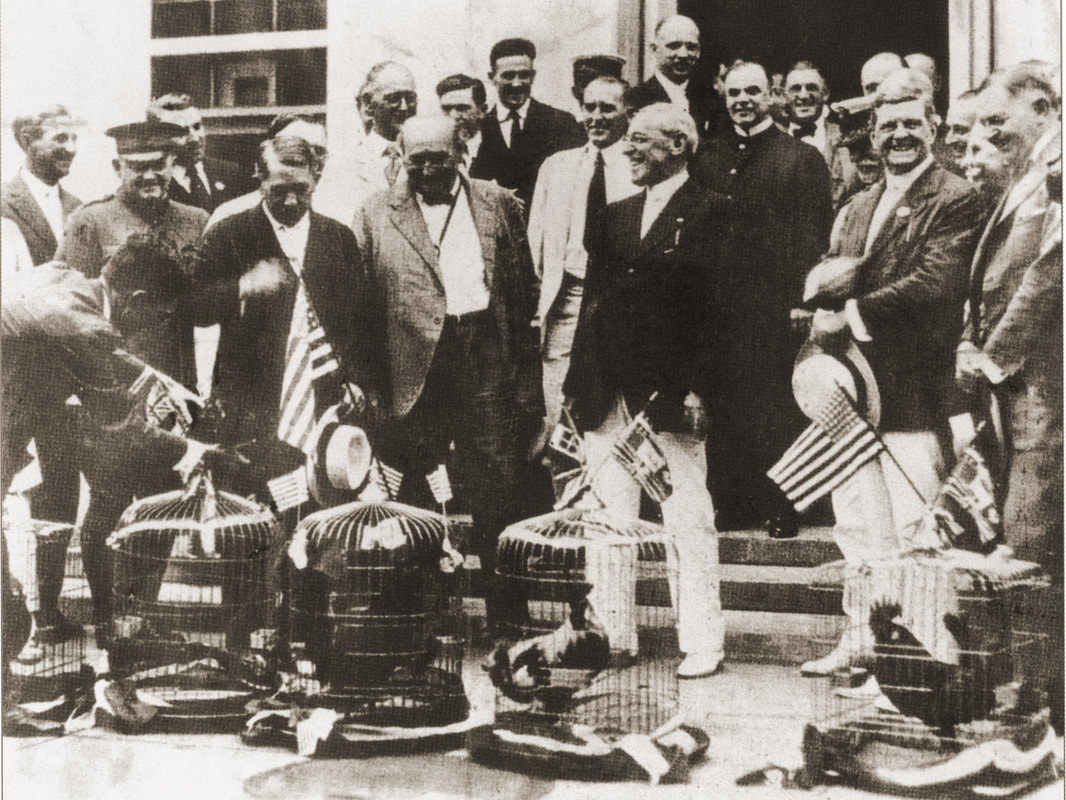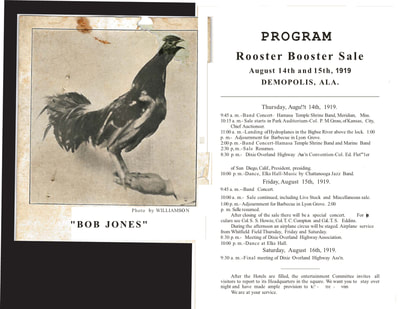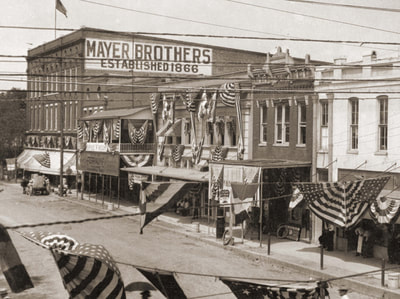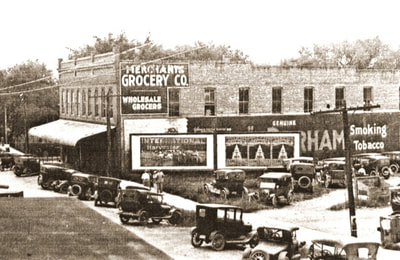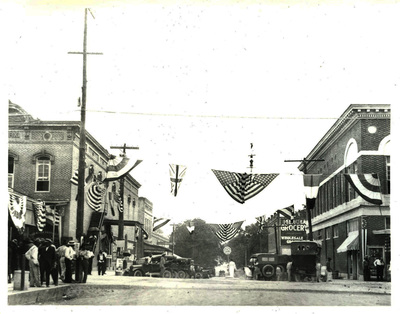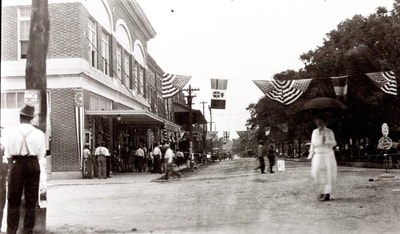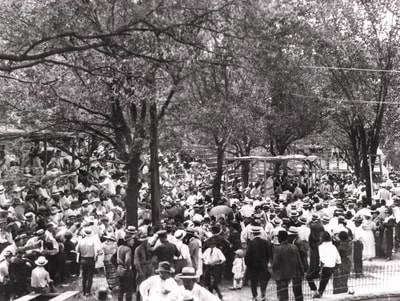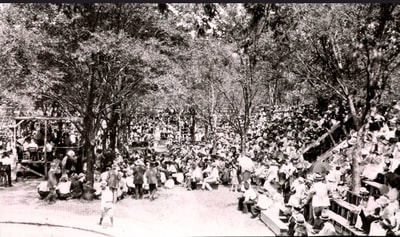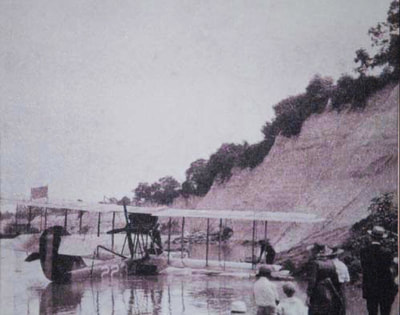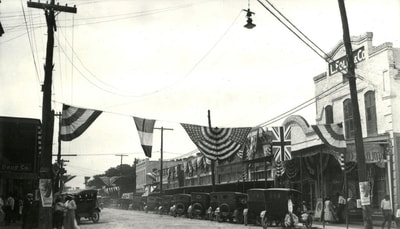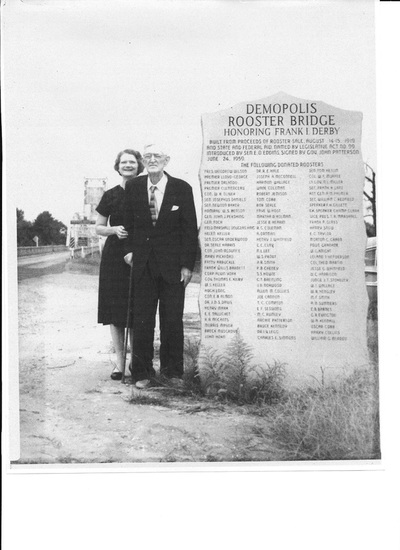Rooster Day
THE GREAT ROOSTER AUCTION of 1919
The Dixie Overland Highway was near completion. This highway stretched from San Deigo, California to Savannah, Georgia; with the only major waterway without an adequate bridge being the Tombigbee River in West Alabama. The much-needed bridge would connect Marengo County and Sumter County. The people of Demopolis and Marengo County formed the Demopolis Road Committee to raise half of the funds needed to build the bridge. The other half of funds would come from the State of Alabama and Federal Funds.
Percy Coleman, president of the Dixie Overland Highway Association and the Demopolis Chamber of Commerce, obtained the services of a famous auctioneer in the area, Frank Inge Derby, Sr. from Sumter County. Mr. Derby had a history of unique fundraisers. He helped earn $73,756 for the Red Cross in Birmingham with the sale of 57 Shorthorn bulls at the Tutwiler Hotel which impressed the committee, along with local auctions Derby conducted in the area. To conduct the rooster auction, Derby agreed to receive $25,000 if the auction collected $75,000 and nothing if collections were less than this amount. Derby came up with the slogan “Bridge the Bigbee with Cocks.” Derby was from Sumter County which obtained its name from the Revolutionary War hero, General Thomas Sumter also called the “Gamecock.” (Gamecock is a rooster used in rooster fights, which was common in this time period.)
To enter the amphitheater, eat at the barbecue, and attend the other attractions, attendees were required to purchase and wear a rooster button which cost $2 each. An image of the mascot rooster and Derby's slogan were on the button. There were about 11,000 buttons sold at the 1919 auction.
Derby knew they needed rooster donations from famous people, politicians, actors, and everyday people to get this project to work. Donations from the Big Four were obtained - President Woodrow Wilson; Prime Minister David Lloyd George of England; Prime Minister Georges Clemenceau of France; Prime Minister Vittorio Emanuele Orlando of Italy. In addition, rooster entries were received from Mary Pickford, Roscoe “Fatty” Arbuckle, William McAdoo, Helen Keller, Vice President of the United States Thomas R. Marshall (sent a ten pound white Plymouth Rock), Field Marshall Ferdinand Foch, Field Marshall Douglas Haig, and General John J. Pershing.
Helen Keller felt it would be unladylike to donate a rooster, so she donated a little Blue Hen, which laid an egg during the auction. The egg sold for $15,000 to Greene County. President Woodrow Wilson’s rooster sold for $55,000, the highest bid of the auction.
When the sale was completed between $200,000 to $300,000 was raised on paper but only $65,000 was collected. After $20,000 in expenses was deducted, the total earned was only $45,000. This is short of the $75,000 goal. This shortage means that Mr. Derby only got a thank you, no money for all his hard work.
In 1922 the Alabama Highway Department agreed to pay the balance for building a new bridge with the stipulation that the bridge be named, The Memorial Bridge, in honor of the World War I veterans. The bridge opened on May 15, 1925. Local people always called the bridge, Rooster Bridge. On Frank Derby’s 78th birthday party (1959) at the Demopolis Inn the bridge was officially renamed "The Rooster Bridge." The Alabama Legislature had unanimously passed a bill declaring the bridge be renamed, thanks to the work of Senator E. O. Eddins from Demopolis.
Percy Coleman, president of the Dixie Overland Highway Association and the Demopolis Chamber of Commerce, obtained the services of a famous auctioneer in the area, Frank Inge Derby, Sr. from Sumter County. Mr. Derby had a history of unique fundraisers. He helped earn $73,756 for the Red Cross in Birmingham with the sale of 57 Shorthorn bulls at the Tutwiler Hotel which impressed the committee, along with local auctions Derby conducted in the area. To conduct the rooster auction, Derby agreed to receive $25,000 if the auction collected $75,000 and nothing if collections were less than this amount. Derby came up with the slogan “Bridge the Bigbee with Cocks.” Derby was from Sumter County which obtained its name from the Revolutionary War hero, General Thomas Sumter also called the “Gamecock.” (Gamecock is a rooster used in rooster fights, which was common in this time period.)
To enter the amphitheater, eat at the barbecue, and attend the other attractions, attendees were required to purchase and wear a rooster button which cost $2 each. An image of the mascot rooster and Derby's slogan were on the button. There were about 11,000 buttons sold at the 1919 auction.
Derby knew they needed rooster donations from famous people, politicians, actors, and everyday people to get this project to work. Donations from the Big Four were obtained - President Woodrow Wilson; Prime Minister David Lloyd George of England; Prime Minister Georges Clemenceau of France; Prime Minister Vittorio Emanuele Orlando of Italy. In addition, rooster entries were received from Mary Pickford, Roscoe “Fatty” Arbuckle, William McAdoo, Helen Keller, Vice President of the United States Thomas R. Marshall (sent a ten pound white Plymouth Rock), Field Marshall Ferdinand Foch, Field Marshall Douglas Haig, and General John J. Pershing.
Helen Keller felt it would be unladylike to donate a rooster, so she donated a little Blue Hen, which laid an egg during the auction. The egg sold for $15,000 to Greene County. President Woodrow Wilson’s rooster sold for $55,000, the highest bid of the auction.
When the sale was completed between $200,000 to $300,000 was raised on paper but only $65,000 was collected. After $20,000 in expenses was deducted, the total earned was only $45,000. This is short of the $75,000 goal. This shortage means that Mr. Derby only got a thank you, no money for all his hard work.
In 1922 the Alabama Highway Department agreed to pay the balance for building a new bridge with the stipulation that the bridge be named, The Memorial Bridge, in honor of the World War I veterans. The bridge opened on May 15, 1925. Local people always called the bridge, Rooster Bridge. On Frank Derby’s 78th birthday party (1959) at the Demopolis Inn the bridge was officially renamed "The Rooster Bridge." The Alabama Legislature had unanimously passed a bill declaring the bridge be renamed, thanks to the work of Senator E. O. Eddins from Demopolis.
|
The 1919 Rooster Auction even boasted the support and donation of roosters from President Woodrow Wilson, Prime Minister David Lloyd George of England, Prime Minister Georges Clemenceau of France, Prime Minister Vittorio Emanuele Orlando of Italy, and the King of Belgium. These five roosters were the centerpiece of their advertising plan. On July 31, 1919 the five famous roosters of the “Big Four” in their gold gilt cages with flags of each nation on top were photographed on the steps of the White House. President Woodrow Wilson presented the five famous roosters to thirty Demopolis Road Committee members, Alabama Delegation, and members of the Senate and House of Representatives.
|
